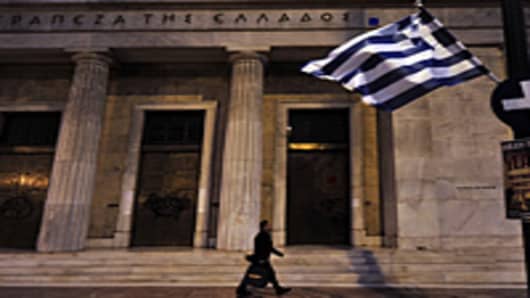Following months of talks, Germany now appears ready to drop demands it has made in order to allow Greece to restructure its debt and prevent the government in Athens from running out of cash over the summer.
The Wall Street Journal reported on Tuesday the German government had decided to drop its demands in a bid to facilitate a new package of loans ahead of a report by the European Union, the European Central Bank and the International Monetary Fund on Greece’s compliance with the terms of a previous bailout.
It is estimated that Greece will run out of funds by mid July if no new package is agreed. With policy makers deeply divided over plans to finally resolve the crisis, it appears the euro zone will follow a well-trodden path of kicking the can down the street until further crisis forces a different response.
In order to get agreement on a new package, reports indicate Athens will be forced to international oversight over Greek tax collection and major privatizations, with both conditions likely to be hugely unpopular with the Greek electorate.
For months the debate over what to do with Greece next has focused on either restructuring its debt or forcing ever tougher conditions onto Athens in return for further funds. Germany has until now favored some form of restructuring. The ECB has opposed such action, with some ECB board members warning of Lehman-like consequences if this were to happen.
The third key party, the IMF, has been hampered by the scandal that forced Dominique Strauss-Kahn to resign, whilst also pushing for new austerity measures to be imposed on Greece before it hands over any more cash.
ECB Wins the Battle, Not the War
Like a group of friends arguing over the bill after a big meal, the key players in this Greek tragedy just cannot decide who should pick up the tab.
As Christian Gattiker-Ericsson, the chief strategist and head of research at Julius Baer suggested last week, the Greek people are already paying the price for their government’s fiscal problems via austerity.
But with austerity failing to bring Greece’s budget back into balance as weaker growth hits tax revenues, another option is needed. With restructuring now reported to be off the table, the bill will not be picked up by the euro zone banks that hold much of that debt.
That leaves more money being handed over to Greece to give it room to breathe on funding over the rest of 2011. Robert Barrie from Credit Suisse predicted this would be the most likely option last week, forecasting any deal could include a major privatization plan which would help pay down Greece’s total debt.
So in return for more austerity and asset sales, more loans will be handed over to Greece despite many people believing the country to be insolvent. Carl Weinberg, the chief economist at High Frequency Economics has been calling for restructuring for months, arguing that further delay would simply lead to an even more painful default in the future.
The market backs this view if the yields on Greek debt are to be believed. Whilst euro zone policy makers and the IMF can probably get away with another short term loan it is unlikely such a move would actually solve the problem itself, meaning at some point the question of Greece’s solvency will still have to be addressed.
The CEO of Italian banking giant Unicredit told CNBC on Monday that the opportunity to restructure Greece’s debt had been missed.
“My opinion is that re-profiling or restructuring or re-cutting, whatever you want, would have been possible maybe one year ago,” Federico Ghizzoni said. “No more now. It’s too late.”
Others disagree and claim the loans offered to Greece so far have been for the benefit of banks across Europelike Unicredit .
“The rescue package has never been right in the first place,” said Karsten Schroeder, the CEO of Amplitude Capital told CNBC.
“In all honesty, the EU-IMF package was a rescue package for banks exposed to their debt and not Greece itself. It was wrong in the first place,” Schroeder added.
In Schroeder’s view Greece, and Portugal for that matter, should opt to default on debt as soon as possible and even consider leaving the euro.
With little support for this option amongst any of the key players it remains a very unlikely outcome. Instead, the can is likely to be kicked down the road for a little while longer until the next crisis forces policy makers to start the whole debate all over again.





